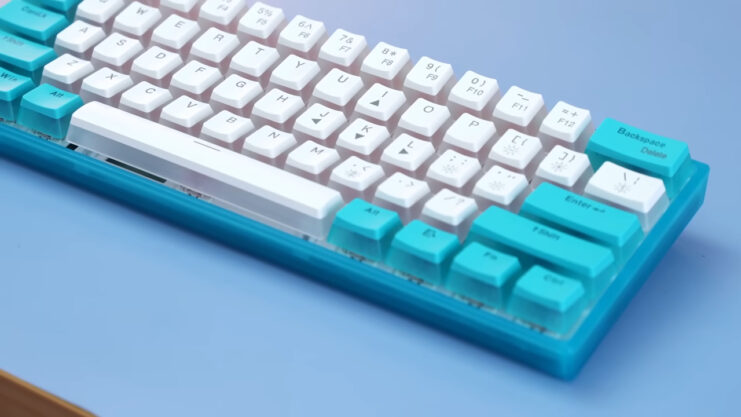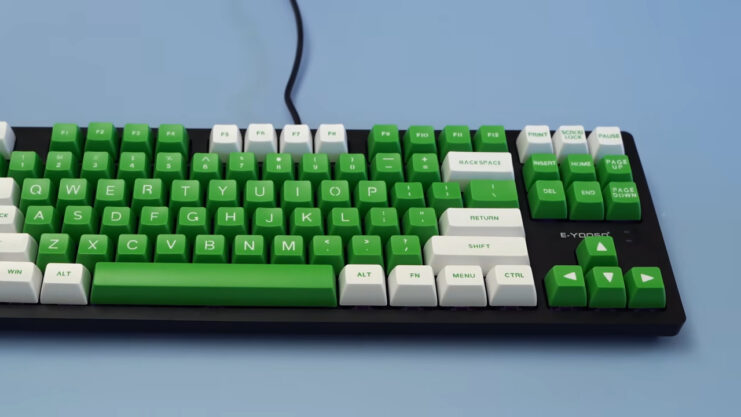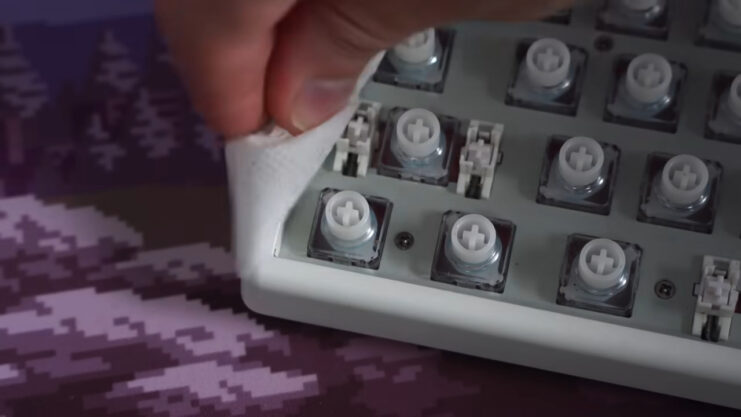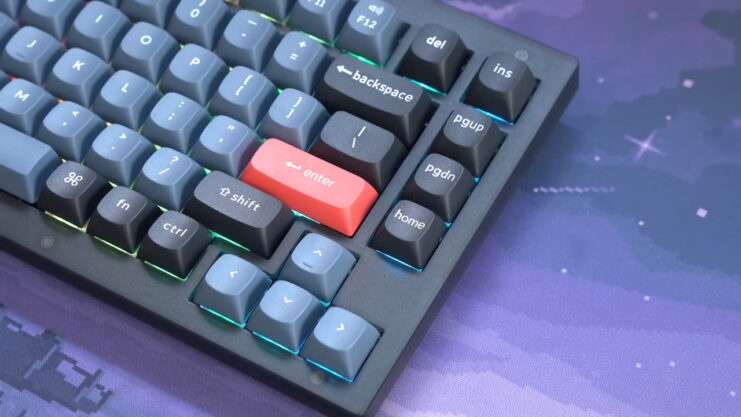Mechanical keyboards have gained popularity among gamers, typists, and professionals alike due to their durability and tactile feedback. Many people are often curious about the lifespan of these devices, as they typically come with a higher price tag compared to their membrane keyboard counterparts.
Today, I’ll discuss the expected lifespan of mechanical keyboards and some factors that can influence their longevity.
The Lifespan of Mechanical Keyboards
In my experience, mechanical keyboards are known for their durability and longevity. On average, they can last for about 10 to 15 years with heavy typing or gaming. These keyboards are designed with individual mechanical parts, making them more resilient than their membrane counterparts.
I find that one of the primary factors contributing to a mechanical keyboard’s lifespan is the quality of its switches. Typically, these switches are rated for 50+ million keystrokes, allowing for years of heavy use.
Some popular switch types include Cherry MX, Gateron, and Razer, each with its own distinctive feel and durability. Another important aspect of mechanical keyboards’ lifespan is proper maintenance. I regularly clean and care for my keyboard to prevent damage and sustain its longevity.
Taking care of a keyboard can significantly extend its life. Of course, removing the keys before cleaning is an absolute must.
Factors Influencing the Durability

Now, let us take a look at some factors that can influence the durability.
Quality of Construction
In my experience, the quality of construction plays a significant role in the durability of a mechanical keyboard. High-quality ones are typically built with sturdy materials like aluminum or steel, which provide better stability and resistance to wear and tear. Of course, there is a difference between mechanical and membrane devices.
It is also important to consider the quality of mechanical switches used in the keyboard. Some popular options include Cherry MX, Gateron, and Razer switches, which are known for their durability and long-lasting performance. I would recommend checking the build quality and specifications of the keyboard before making a purchase.
Usage
| Factor | Impact on Lifespan | Recommended Actions |
|---|---|---|
| Intensity of Use | Heavy use can lead to faster wear of key switches and components. | Moderate use; regular breaks. |
| Typing Speed | Faster typing speeds may increase wear on keys and switches. | Maintain a comfortable speed. |
| Typing Habits | Aggressive typing or hard key presses can reduce lifespan. | Adopt a gentle typing approach. |
| Environmental Conditions | High humidity and extreme temperatures can damage internal parts. | Use in a clean, temperate setting. |
| Keystroke Limit | Generally ranges between 50 to 70 million keystrokes. | Regular maintenance and cleaning. |
| Cleaning and Maintenance | Lack of maintenance can lead to dust buildup and wear. | Clean regularly; address repairs. |
| Storage Conditions | Poor storage can expose to harmful conditions. | Store in a controlled environment. |
Maintenance and Cleaning
Proper maintenance and cleaning are essential to keep a mechanical keyboard functioning optimally over time. Dust and debris can accumulate between the keys and affect the performance and feel of the switches. Routine cleaning, such as removing keycaps and using compressed air to blow out dust, can help maintain the functionality.
In addition to regular cleaning, lubricating the switches and stabilizers can improve the overall typing experience and reduce wear on the components. However, it is essential to use the correct type of lubricant and follow the manufacturer’s guidelines to avoid causing any damage.
Signs Your Mechanical Keyboard Needs Replacing

Mechanical keyboards are renowned for their durability and tactile feedback, making them a preferred choice for typists and gamers alike. When it comes to signs that you must replace them, their number is quite high.
Uncomfortable Typing Experience
If you find that your typing sessions are becoming increasingly uncomfortable, it might be time to inspect your keyboard for signs of wear. Key issues to look out for include:
- Stiff or heavy keys that require more force to press.
- Uneven key response across the keyboard.
- Squeaky or grinding noises during typing.
These issues can lead to finger strain and a decrease in typing speed and accuracy.
Impact on Typing Efficiency
The comfort of your keyboard directly impacts your typing efficiency. An uncomfortable keyboard can cause:
- Increased typing errors.
- Slower typing speed.
- Reduced overall productivity.
Broken or Unresponsive Keys
Mechanical keyboards are lauded for their long-lasting key switches, like the Cherry MX. However, over time and with extensive use, these switches can degrade. Symptoms of failing switches include:
- Keys that don’t register a press consistently.
- Keys that need to be pressed harder than others to register.
- Complete failure of certain keys.
Consequences of Key Failure
Key failure can severely hamper your keyboard’s functionality, leading to:
- Frustration during typing or gaming sessions.
- The need for frequent corrections while typing.
- Potential interruptions in workflow or gaming performance.
Physical Issues
Physical damages are often the most visible signs that your mechanical keyboard needs replacing. These include:
- Broken or missing keycaps.
- A cracked or warped keyboard frame.
- Loose or unstable keys.
Such physical damage not only affects the aesthetic appeal of your keyboard but also its structural integrity and functionality.
Effects of Dust and Debris

Dust and debris accumulation is a less noticeable but significant issue. Over time, particles can get lodged inside the switches, causing:
- Inconsistent key response.
- Increased wear and tear on the switches.
- Potential for short-circuiting and other electrical issues.
FAQs
Does backlighting or RGB lighting in mechanical keyboards affect their durability?
Backlighting or RGB lighting usually has minimal impact on the overall durability of the keyboard, as these features are separate from the mechanical switch components.
Can the usage of a keyboard wrist rest extend the lifespan of a mechanical keyboard?
While a wrist rest doesn’t directly extend the lifespan of the keyboard, it can reduce strain on the keys by promoting better typing posture and technique.
Are there any specific environmental conditions that can drastically shorten a mechanical keyboard’s life?
Extreme temperatures, high humidity, and exposure to liquids can drastically shorten the life of a mechanical keyboard by causing physical and electrical damage.
If a mechanical keyboard starts making different sounds, is it a sign of wearing out?
Changes in the sound of a keyboard can indicate wear or mechanical issues with the switches, which might be a sign that the keyboard is starting to wear out. Regular maintenance and check-ups can help identify these issues early.
Do brand and build quality impact the longevity of mechanical keyboards?
Certainly, brand and build quality do have an impact on the longevity of mechanical keyboards. Some brands are known for using higher-quality components and having better manufacturing processes, resulting in a longer-lasting device. Investing in a reputable brand or a keyboard with a robust build quality can ensure the longevity you’re looking for in a mechanical keyboard.
Closing Thoughts
As you can see, with proper care and maintenance, mechanical keyboards can significantly outlast their membrane counterparts and provide users with a consistent, high-quality input experience over time.
By considering factors such as switch durability, the quality of components, and your level of usage, you’ll be able to maximize the lifespan of your mechanical keyboard.

